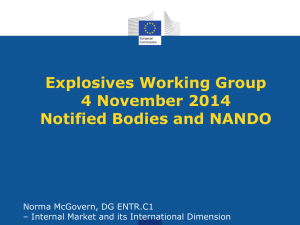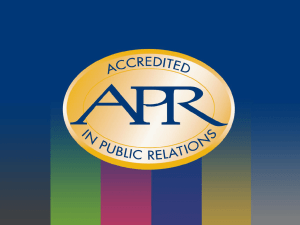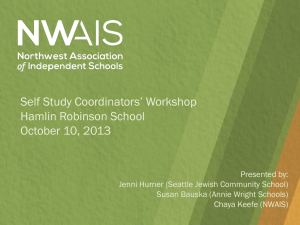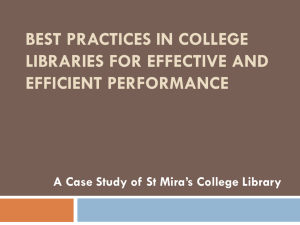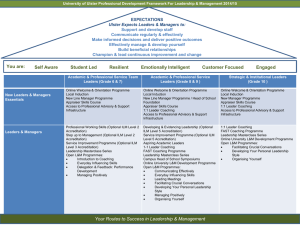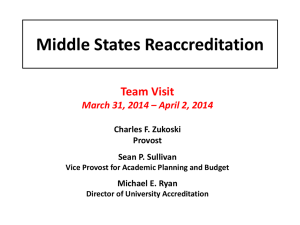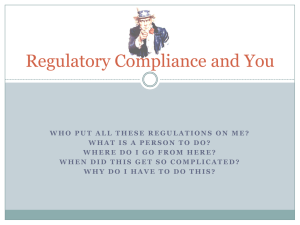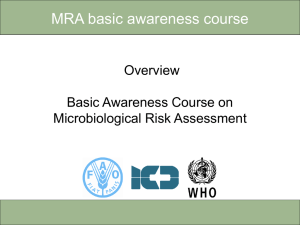2014-04-08-02TCB Meeting Presentation NIST
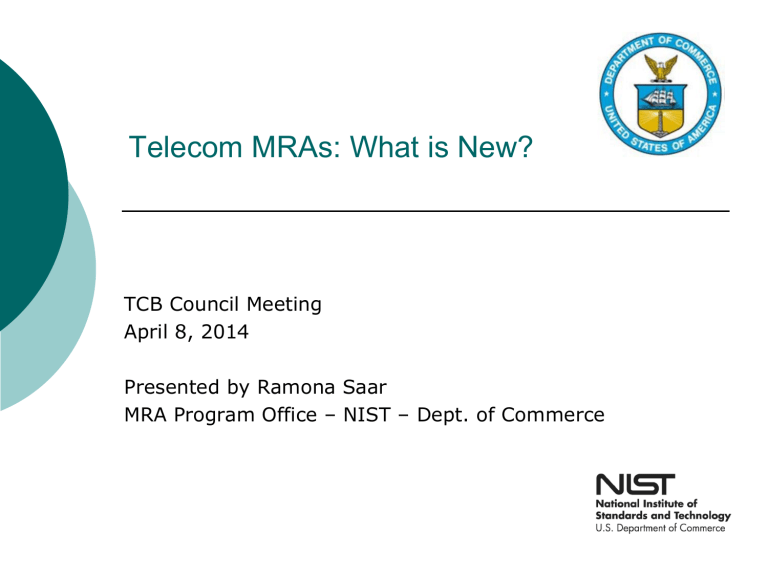
Telecom MRAs: What is New?
TCB Council Meeting
April 8, 2014
Presented by Ramona Saar
MRA Program Office – NIST – Dept. of Commerce
Outline of Topics
New EMC Directive
Key Dates
Changes
Role of Accreditation
Next Steps for NIST
MRA Program Office Activities
What is Available for US CABS?
News - Israel
News - Vietnam
Next Meetings
New EMC Directive
EMC Directive (Directive 2014/30/EU) was published in the
Official Journal of the European Union (OJEU) on
March 29, 2014.
Rationale for Revisions
Across various industry sectors…“Experience…has shown”:
…non-compliant product on market, mistrust of CE mark
…competitive disadvantages to those following the rules
...varying enforcement practices
Differing practices in the designation of CABs by national authorities
Problems with the quality of certain notified bodies
In 2008 - New Legislative Framework (NLF)
NLF Regulation on accreditation and market surveillance
NLF Decision establishing common framework for marketing of products
Process to align various Directives was initiated
Important Dates
Entry into Force Date for new EMC Directive (2014/30/EU):
April 20, 2014 (Art. 46)
Member State Transposition Date:
by April 19, 2016 (Art.44)
“Old” EMC Directive (2004/108/EC) Repeal Date:
April 20, 2016 (Art. 45)
Products placed on the EU market on or after April 20, 2016 must comply with the new Directive. (Art. 43)
U.S. NBs must be re-notified to the new Directive before this date.
Timing and process for re-notification not yet determined
Additional Guidance To Be Made Available
New 2014 Blue Guide on Implementation of EU Product Rules has just been published.
Guidance from EUANB (Group of Notified Bodies Under the EMC
Directive
-
May 20, 2014 Meeting – Amsterdam
Guide for the EMC Directive to be revised
Commission to provide U.S. with details on implementation of the
Directive under the MRA
Key Sections on NBs
Chapter 4: Notification of Conformity Assessment Bodies
Notifying Authorities (Art. 21)
Requirements Relating to Notifying Authorities (Art. 22)
Information Obligations on Notifying Authorities (Art. 23)
Requirements Related to Notified Bodies (Art. 24)
Application for Notification (Art. 27)
Notification Procedures (Art. 28)
Identification numbers and Lists of Notified Bodies (Art. 29)
Challenge of the Competence of Notified Bodies (Art. 31)
Operational Obligations of Notified Bodies (Art. 32)
Information Obligations on Notified Bodies (Art. 34)
Coordination of Notified Bodies (Art. 36)
Annex III: Module B: EU-Type Examination Certificate
Notifying Authority
One in each Member State and in MRA Countries
Responsible for setting up and carrying out the necessary procedures for
Assessment of CABS
Notification of CABS
These two functions can be carried out by an accreditation body
Monitoring of NBs
Restrict/Suspend/Withdraw Notification (Art. 30)
NIST serves as the Notifying Authority to the Commission for the U.S.
Notifying Authority - Qualifications
Must:
Not have any conflict of interest with CABS
Be objective, impartial, and safeguard confidentiality
Ensure that a decision on notification of a CAB is taken by persons different than those carrying out the assessment.
Have a sufficient number of competent personnel to properly perform tasks.
Provide Commission with procedures for assessment and notification of CABs and monitoring of NBs. The Commission will make this information public.
EU-Type Examination Certificate (Annex III) &
Supporting Evaluation Report
Replaces NB Statement of Opinion
Module B: NB must determine if product design complies with relevant legislative requirements.
Certificate: Manufacturer name, address, conclusions, essential requirements covered, validity conditions, data for type identification, any other relevant information
- made available to Commission, Member States and other
NBs upon request
Supported by: NB evaluation report that indicates what activities were done to examine manufacturer’s technical documentation to assess the adequacy of the technical design with relevant essential requirements.
- made available to Commission and Member States upon request
Information Obligations from Manufacturer
Manufacturer must select a single NB (supported by a written declaration in application process to NB)
Manufacturer must notify the NB of modifications that affect the conformity of the apparatus with essential requirements or validity conditions for the Certificate
- A new Certificate may be required
Information Obligations to Manufacturer
NB must monitor “state of the art” and notify manufacturer if any changes impact compliance of apparatus with applicable Directive requirements
What is “state of the art”?
(27) Harmonized standards reflect the generally acknowledged state of the art as regards electromagnetic compatibility in the Union
Information Obligations to NIST (Art. 34)
NB shall inform NIST (Notifying Authority) of
Refusals, restrictions, suspension, withdrawals of EU-Type
Examination Certificates
Any requests received from Market Surveillance Authorities
CAB activities performed as NB (upon request)
Information Obligations to Other NBs
(Art. 34)
NB shall inform other NBs of
Relevant information on issues relating to negative and (on request) positive conformity assessment results.
(Annex III # 8)
NB shall inform other NBs
“…concerning…certificates and/or additions to which it has refused, withdrawn, suspended or otherwise restricted.”
Coordination of NBs:
Requirements Relating to NBs (Art. 24)
# 11 - Added:
The NB must participate in (or be informed about)
Relevant standardization activities
Activities of the NB coordination group*
Must apply administrative decisions and documents produced by the group.
* EUANB for EMC Directive
Changing Role of Accreditation in the
Notification Process
Accreditation “As Preferred Route”
Text in new EMC Directive
“…Since accreditation is an essential means of verifying competence of CABs, it should also be used for the purposes of notifications.”
New Blue Guide on the Implementation of EU Product Rules
“accreditation…favored instrument for evaluating competence and integrity of the bodies to be notified” (page 70).
European Cooperation for Accreditation (EA) http://www.europeanaccreditation.org/role
“The process of achieving notification has changed such that accreditation is now the preferred route by which a conformity assessment body demonstrates its competence to become a Notified
Body.”
Accreditation for NB functions
(Art. 27 – 2) “Application for notification shall be accompanied by…….accreditation certificate, where one exists, issued by a national accreditation body attesting that the CAB fulfils the requirements of
Article 24.” (Requirements for Notified Bodies.)
Note that for the accreditation to be accepted, the NB functions would need to be included under the Scope of Accreditation .
Until now, this has not been the case for US NBs.
Accreditation to ISO/IEC 17025 has been a prerequisite only to demonstrate to NIST knowledge of harmonized standards.
All other requirements for NB functions have been evaluated directly by NIST, not the ABs.
When NB is Not Accredited for NB functions
Must Release Evidence of Competency Evaluation to Commission and
Others
(Art. 28 4) “Where a notification is not based on an accreditation certificate…the notifying authority shall provide….documentary evidence which attests to the CAB’s competence and arrangements for monitoring…”
See Blue Guide, 5.3.2.4 for guidance on the evaluation procedure to be followed in accreditation is not used as basis for notification:
When NB Not Accredited for NB functions
The NB Will Face a Longer Commission Decision Process
Timing of Decision on NB status (Art. 28 – 5)
2 weeks with accreditation certificate
2 months without accreditation certificate (for NB functions) and release of all NB documents to demonstrate compliance with NB requirements as noted on previous slide.
Accreditation of NBs in the EU
Competent/National Authority in each Member State may elect to have NB assessment/accreditation role for their AB.
NB functions are not an exact fit with current accreditation standards such as
ISO/IEC 17025 and/or ISO/IEC Guide 65 (ISO/IEC 17065).
European Co-Operation for Accreditation
– EA has published
EA-2/17: EA Guidance on the Horizontal Requirements for the
Accreditation of CABS for Notification Purposes .
Connects key NB requirements with key clauses of several accreditation standards such as EN 45011 (G65), EN ISO/IEC 17025…..
Example of EU AB reference document: UKAS
P16: Accreditation for the purposes of appointment as approved and notified bodies
EMC Directive – Notified Bodies (NBs)
EU lists 178 NBs for the EMC Directive (2004/108/EC)
22 of these NBs are in the U.S.
All 22 are ISO/IEC 17025 accredited – but NB functions not covered.
14 of 22 are also ISO/IEC Guide 65 accredited – NB functions not covered.
Blue Guide (p. 120, 3.2)
For Module B, ISO/IEC 17025 “not appropriate”
ISO/IEC 17020 and ISO/IEC 17065 “can be considered”
Conclusions
Changes to EMC Directive are significant for NBs and NIST.
Formal ISO/IEC 17065 accreditation for NB functions is now preferred (for Module B).
Alternative NIST led NB evaluation/assessment program is not seen as a good option if private sector accreditation bodies can meet the necessary requirements to conduct this conformity assessment activity.
Next Steps for NIST
Attend EUANB Meeting and confirm transition process and timing with
Commission
Obtain stakeholder input for (and keep stakeholders informed of) development of NB Notification scheme requirements
Publish NB Notification scheme requirements and conduct workshops/training as needed
Process re-designation applications for notification from qualified CABs that meet NB requirements.
Formally withdraw all NB notifications to the old Directive on April 19 th (or
20 th ) 2016.
Follow applicable steps for the RED Directive.
Part II: MRA Program Office Activities
What is available?
Lab recognition is available for 8 economies for specific standards/regulations:
Australia, Canada, Chinese Taipei, Hong Kong, Korea,
Singapore, and Vietnam
Israel
Certification Body (CB) recognition is available for 4 economies for specific standards/regulations:
Canada, Hong Kong, Singapore, and Japan
Notified Body (NB) status is available for the EU for the EMC
Directive and the R&TTE Directive
TCB designation to the FCC is available through NIST. Formal recognition is issued by the FCC
Current Activities
The NIST MRA Program includes 83 CABS in 112 locations holding 381 separate formal MRA Partner recognitions for specific standards/regulations.
MRA signed but not implemented yet with one economies:
Mexico
The U.S. Government is engaged in dialogue for new agreements with two economies:
Korea (CB recognition) and Malaysia (lab recognition)
Israel – Now Available
Signed October 15, 2012
Test lab recognition – Phase I
NIST Criteria Document published February 7, 2014.
NIST is accepting applications for designation as of March 31, 2014.
No CABs designated yet.
Link to MRA text: http://www.ustr.gov/sites/default/files/US-
Israel%20MRA%20Text.pdf
Vietnam - Update
Vietnam/MIC Annex I Update
Release of updates to Annex I for Vietnam/MIC on February 7,
2014 and March 14, 2014.
here .
New Vietnam/MIC Designation Requirement – Template/Sample Test
Report
For CABs newly seeking designation: requirement is now effective. See the Required Documents (Item 7) and the
Vietnam Specific Requirements page.
For CABs already recognized by MIC: NIST will be contacting each recognized CAB directly with a request for a template/sample test report. CABs will be given at least 30 days to send NIST the template/sample.
Next MRA-Related Meetings
APEC TEL Working Group & MRA Task Force
Yangzhou, China
April 21-26, 2014
RTTE CA & EUANB Meetings
Amsterdam, The Netherlands
May 19-20, 2014
-
NIST MRA Program Office
Information - Website
NIST MRA Team:
Staff: Gerry Baker, Nathalie Rioux, Ramona Saar
Contractors: Joe Dhillon, Dan Hoolihan
Questions about MRAs
Please send your request to mra@nist.gov
Direct Contact Information
Ramona J. Saar
NIST, Program Manager ramona.saar@nist.gov
Thank you.
